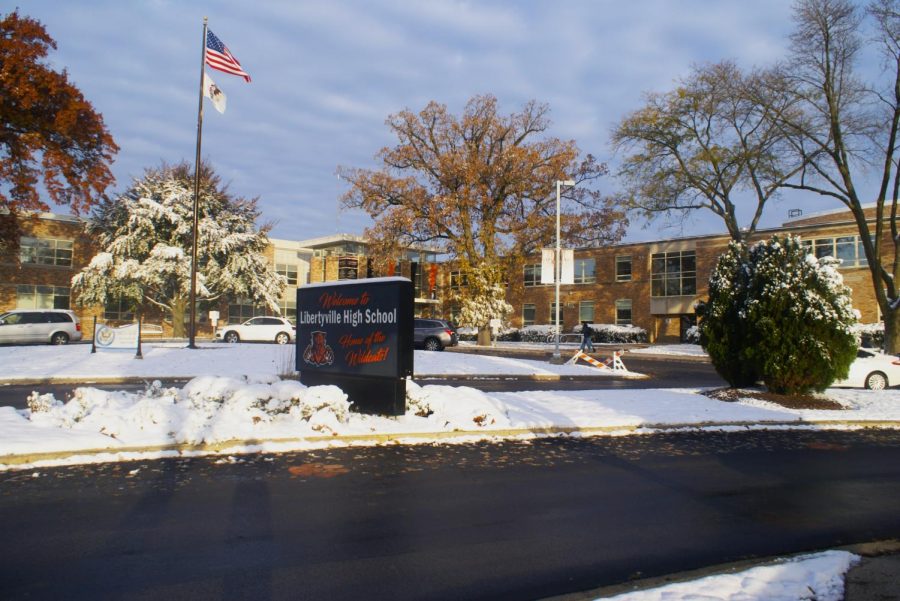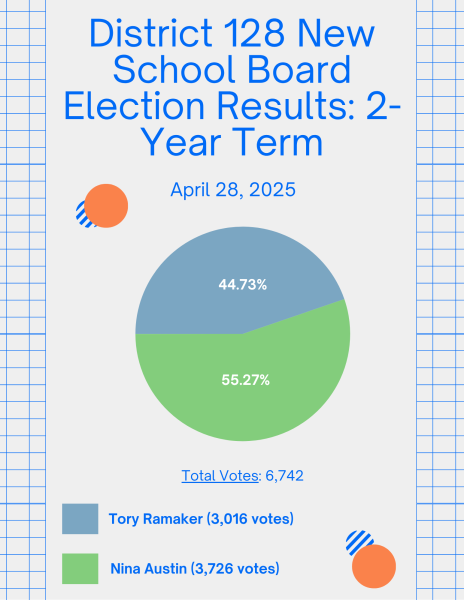D128 implements new e-learning policy
Instead of making up snow days during or after the school year, District 128 is planning to instead start using e-learning days, where students can make up the snow days at home.
Earlier this school year, the District 128 School Board announced that e-learning days will occur in place of canceled school days when the two emergency days built into the calendar have been used; the board is in the process of determining details for these days, such as the amount of time they will last and attendance procedures.
Considering the recent October snowfall, the Board is looking to institute the revised e-learning plan this year, if necessary. Especially due to events such as graduation and AP exams, many are in favor of not extending the school year past its scheduled end.
“I would think [e-learning days] would be few and far between, but I do like having the option of doing something like that as opposed to extending the school year,” expressed Ms. Teresa Elmore, an AP Computer Science teacher.
The forthcoming changes are meant to overall improve the e-learning experience for students and staff alike. LHS already has two built-in emergency days, so an e-learning day would only happen if both of those days were used.
“[We want to be] using an e-learning day on an emergency day to continue the learning that’s already happening in the classroom,” explained Dr. Rita Fischer, the district’s assistant superintendent for curriculum and instruction.
Requirements for an e-learning plan, set out by the Illinois State Board of Education, include having a public hearing for the community to express feedback, at least a 30-day notice for teachers about how e-learning days will function, communication with staff, teachers, and parents, and five hours of required school work throughout the day.
The District 128 School Board developed a plan and presented it at a public hearing prior to the Aug. 26 board meeting. At the meeting, the Board approved the plan, and it was sent to the Lake County Regional Office of Education (ROE), which was charged by ISBE to review the plan.
“This plan represents the framework that was presented to the Board [as part of] a collaborative conversation [about e-learning],” stated Dr. Fischer.
The e-learning aspect of the day refers to how class work and information is distributed, as well as how teachers and students communicate. The work assigned does not necessarily have to be online-oriented.
While e-learning days are meant to connect class learning to learning at home with the help of electronic communication, it can be difficult for teachers to alter their lesson for the day.
“It’s hard to replicate what we do in the classroom with something that you’re doing online,” stated Ms. Elmore.
Some students agree, stating that the learning process itself can be more difficult.
“A lot of people work better when it’s not just learning from a screen and they’re learning from a real person because it’s more engaging, and then if they have questions, they can just ask the teacher,” shared junior Laurie Taranowski. “It’s just easier for a lot of people to learn that way.”
Dr. Fischer agreed that e-learning days are not equal to full school days, but that nevertheless, they are important in preventing add-on school days at the end of the year; she also believes they can have other benefits.
“I do think having a sound e-learning experience while in high school helps to prepare students for that future [of electronic communication], but we also know that we want to get it exactly right for our community so that’s it’s a meaningful experience for students and for teachers,” expressed Dr. Fischer.
The concept of e-learning has been in development for the past few years, and the Board is still making adjustments to how check-ins will occur, what the e-day schedule would be exactly and other specificities. The Board will take into account feedback from the community — teachers, students, and parents alike — about the e-learning day.
“Any time you try something brand new, it’s not perfect; there are going to be some glitches, but again, with this new legislation, the key is there are some components that we have to make sure that we’re hitting exactly, with our plan to be consistent with what the legislation requires,” stated Dr. Fischer.





![Mr. Abullh Ali, manager/assistant, helps open Queen Yemeni Coffee in downtown Libertyville at 606 North Milwaukee Ave. With the help of employees such as manager and LHS senior Yousef Taha, they are able to bring the Yemeni and Ethiopian culture to Libertyville by using their Queen spices, cinnamon and cardamom in their drinks such as Adani Chai, which is inspired by Sheda, the Queen of Yemen and Ethiopia. “The history of our coffee [is] a long history and we believe that Yemen and Ethiopia started the coffee and we are bringing something unique to the community,” Mr. Ali said.](https://www.lhsdoi.com/wp-content/uploads/2025/04/Photo-1-600x400.jpg)



